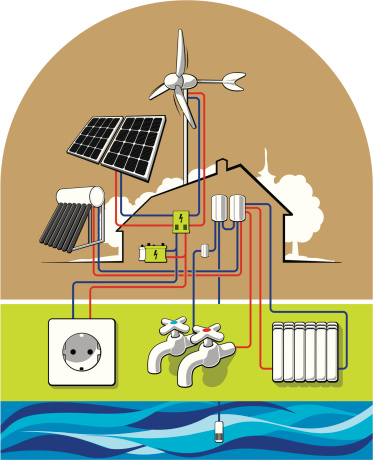 If you're thinking of getting a new home heating system there's no doubt you'll come across alternatives to traditional heating systems, or those that rely on gas-fired furnaces. While newer Energy Star models can be amazingly efficient, it's important to at least know the basics about new types of technologies on the market.
If you're thinking of getting a new home heating system there's no doubt you'll come across alternatives to traditional heating systems, or those that rely on gas-fired furnaces. While newer Energy Star models can be amazingly efficient, it's important to at least know the basics about new types of technologies on the market.
Absorption
Absorption heating systems are powered by geothermal, solar or the most common form of energy: natural gas. Absorption heat pumps function like other heat pumps, but they're powered by a natural gas burner instead of electricity and the pumps use a water-ammonia solution, not a refrigerant.
Active solar
The sun is the greatest source of “green energy.” Solar cells installed on roofs contain photovoltaic materials, which convert that precious resource directly into electricity. The electricity, in turn, can be used to heat, cool and light a home.
Biodiesel
Once used only in trucks and tractors, a new form of biodiesel contains up to 20 percent biofuel mixed with heating oil for use in oil furnaces. Its appeal: it's a renewable, clean-burning fuel.
Biomass
Wood is the most common form of biomass, but it's not the only one. The natural energy from trees and plants also can be converted into heat energy. Biomass is appealing because it's sustainable and cheaper than natural gas, oil and propane and releases less carbon.
Geothermal
This ground-based system functions through a series of pipes, called a loop. A geothermal heat pump collects the earth's natural thermal energy through these pipes. Water circulates through the pipes and carries heat to a home, where a heat exchanger and compressor distribute the heat through ductwork. In the summer, the process is reversed: the loops draw excess heat from a home and send it back to be absorbed by the earth.
Green coal
That's no oxymoron. While coal can contain between 25 and 90 percent carbon, scientists have discovered how to use the carbon to remove oxygen from water, which produces clean-burning hydrogen gas for fuel. This gas is then used to power a turbine, which produces electricity. The emissions are pumped underground, and other pollutants are converted into solids that can be burned for heat.
Hydronic heating
You might think that radiators are found only in old, restored homes, but hydronic heating systems are making a comeback. More sophisticated than their predecessors, hydronic systems boil water or antifreeze. The liquid is then pumped through plastic tubing into a heat exchanger, such as a radiator found in those old, classic homes. In some hydronic systems, boilers heat liquid through geothermal or solar energy.
Ice-powered air conditioners
Now here's an idea that makes perfect sense: a system that converts water into ice, which can then be used to run an air conditioner.
Passive solar
Passive solar technology relies on a home's windows, walls and floors to collect, store and release energy from the sun. Far less expensive than active solar systems, passive solar systems still must be augmented by mechanical equipment to keep a home comfortably warm in the winter and cool in the summer.
Wind power
No, you wouldn't need a towering windmill in your yard to capture wind power to generate heat – only a small, turbine-generated water heater. It can be affixed to a rooftop or another suitably windy location.
Taken separately or together, some of these heating system technologies are nothing less than riveting in terms of their potential to reduce energy costs.
At Experts In Your Home we think it's important for you to be informed and know what technologies are available on the market, but we specialize in installing Heating, Ventilation and Air Conditioning systems (HVAC). Contact us next time you need the services of an expert heating and air technician.
Is your heating system not working correctly? Download the free eBook below to learn the right questions to ask!








